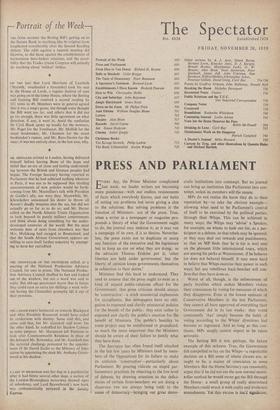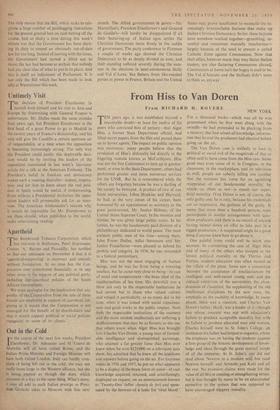PRESS AND PARLIAMENT
EVERY day, the Prime Minister complained ,last week, we leader writers are becoming more ponderous—with our endless restatements of facts which everybody knows, and our habit of setting out problems but never giving a clue to the solutions. But solving problems is the function of Ministers : not of the press. True, when a writer in a newspaper or magazine pro- pounds a theory of what the Government ought to do, the journal may endorse it; or it may run a campaign of its own, if it so desires. Neverthe- less, the press exists not to duplicate or usurp any function of the executive and the legislature but to keep an eye on what they are doing : as the advocate Thomas Erskine put it, 'other liberties ,are held under government; but the liberty of opinion keeps governments themselves in subjection to their duties.'
Ministers find this hard to understand. They tend to assume that the press ought to exist as a kind of unpaid public-relations officer for the Government; that press criticism should always be `constructive'—a stock ministerial euphemism for sycophantic. But newspapers have no obli- gation to expound and clarify ministerial policies for the benefit of the public : they exist rather to expound and clarify the public's reaction for the benefit of Ministers. The public's hostility to some project may be uninformed or prejudiced; so much the more important that the Ministers should be aware of their failure to justify what they have done.
The Spectator has often found itself attacked in the last few years by Ministers (and by mem- bers of the Opposition) for its failure to make its criticism `constructive'—particularly about. Parliament. By pouring ridicule on stupid par- liamentary practices, by objecting to the low level of debates, by drawing attention to the defici- encies of certain front-benchers we are doing a disservice (we are always being told) to the cause of democracy—bringing our great demo- cratic institutions into contempt. But no journal can bring an institution like Parliament into con- tempt, unless its members will the means..
MPs do not realise the harm they do to their reputation by—to take the obvious example— allowing what used to be Parliament's control of itself to be exercised by the political parties, through their Whips. This can be achieved in many ways; the Whips may 'advise' a Speaker, for example, on whom to look out for, as a par- ticipant in a debate, so that rebels may be ignored; or they may deal out rewards and punishments, *so that an MP finds that he is (or is not) sent on the pleasant little international tours, which are among his perks at Westminster, if he behaves (or does not behave) himself. It may seem hard to believe that Whips exercise their power in such ways; but any rebellious back-bencher will con- firm that they have done so.
Worst of all, though, is the enforcement of party loyalties which makes Members violate their consciences by voting for measures of which they disapprove. Even at the lowest estimate of Conservative Members in the last Parliament, they cannot all have approved of everything their Government did in its last weeks : they voted consistently 'Aye' simply because the habit of voting according to the Whips' directions had become so ingrained. And so long as this con- tinues, MPs simply, cannot expect to be taken seriously.
The Betting Bill is not, perhaps, the fairest example of this sickness. True, the Government felt compelled to lay on the Whips—a regrettable decision on a Bill some of whose clauses are, or ought to be, a matter of conscience to some Members. But the Home Secretary can reasonably argue that if he did not use the now normal steam- roller method he would never get the Bill through the House : a small group of really determined Members could wreck it with crafty and irrelevant amendments. Yet this excuse is itself significant. The only reason that the Bill, which seeks to sub- stitute a large number of pettifogging restrictions for the present general ban on, cash betting off the course, had so shaky a time during this week's debate was that the Government has been shirk- ing its duty to amend an obviously out-of-date law for too long. Instead of moving with the times, the Government had turned a blind eye to them; the law had become so archaic that nobody had any clear idea of what to put in its place. And this is itself an indictment of Parliament. It is not only the Bill which has been made to look silly at Westminster this week.







































































 Previous page
Previous page